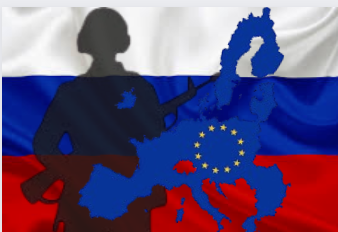
Moscow Seemingly Escalates Confrontation With Europe
Publication: Eurasia Daily Monitor Volume: 21 Issue: 62
By:

Executive Summary:
- Germany detained two suspected Russian agents for allegedly planning to sabotage military facilities while Russian propagandists deny the existence of an espionage network.
- Moscow appears to increasingly consider the West as its primary military adversary, supported by Russian political analysts shifting their focus from political topics to military analytics.
- The Kremlin’s influence operations continue to spread across Europe, and some countries, including Czechia, are taking assertive action against Russian operatives.
On April 17, Bavarian police detained two individuals suspected of working for the Russian intelligence services. They have been accused of conspiring to carry out sabotage and engaging in subversive activities that threaten the security of US military facilities in Germany. According to the prosecution, one of the suspects, in a conversation with a Russian intelligence officer, expressed a readiness to set fire to and detonate military facilities and industrial plants to obstruct aid shipments to Ukraine. According to investigators, he conducted surveillance of transportation routes used for delivering military cargo and of a major military training ground in Grafenwöhr. Additionally, from 2014 to 2016, the accused fought in Ukraine for Russian separatist forces as part of the army of the so-called “Donetsk People’s Republic” (Novayagazeta.eu, April 18). This level of planned espionage indicates a shift in the Russian mindset regarding sabotage in the West and a potential expansion of hostilities in Ukraine.
The most recent incident is far from the first time Russian agents have been detained in Europe. Most cases, however, have been what might be considered “classic” espionage or targeted killings of Russian citizens abroad. Accusations of Russian plans to sabotage foreign targets have been relatively rare. The most notable case was when Czech authorities blamed operatives of the Main Directorate of the Russian General Staff (GRU), Anatoly Chepiga and Alexander Mishkin, for blowing up an ammunition warehouse in 2014 in the village of Vrbětice in eastern Czechia. In 2021, Czech authorities brought the accusation against the two men, who were also suspected of the attempted poisoning of GRU defector Sergei Skripal in London in 2018 (Сurrenttime.tv, April 19, 2021).
Unsurprisingly, Russian propagandists deny the existence of an espionage network in Europe. According to them, Germany is deliberately stirring up espionage paranoia to accuse Russia of last year’s fire at an arms factory in the United States and the explosion at an ammunition factory in the United Kingdom (Vz.ru, April 18). There is currently no evidence linking Russia to these two incidents. Judging by publications from Russian think tanks and military analysts, however, Moscow appears to seriously consider the West as its primary military adversary. Russian political analysts have begun shifting their focus from political topics to military analytics. Notably, prominent Russian group the Valdai Discussion Club dedicated an entire article to analyzing the European Commission’s strategy for mobilizing Europe’s defense industrial base. The authors listed the types of weapons that EU countries have already supplied to Ukraine and assessed the defense capabilities of each European state. In their opinion, the European Union’s current production capabilities cannot fully meet the operational needs of both its member states and Ukraine. Europe, however, still has the potential to continue supplying weapons to Ukraine (Valdai Club, April 18).
Russian military analysts are even more direct in their commentary. They openly discuss the possibility of armed confrontation with the North Atlantic Treaty Organization (NATO). Some have unabashedly proposed a list of Western “targets” for Russian attacks, including US ships concentrated in the Gulf of Aden and the Red Sea (Topwar.ru, April 11). Authors on the website Military Review, closely associated with the Russian Ministry of Defense, asserted, “Our goal is to inflict maximum painful, sensitive losses, primarily on the United States, the United Kingdom, and France. …They need to clearly see the consequences of supplying weapons to Ukraine and ‘indirect’ participation in combat operations. … In general, war must come to them, initially in the form of striped coffins with the bodies of their naval crews” (Topwar.ru, April 18). Notably, Russian analysts have now openly declared a shift in focus from “ordinary” espionage and “active measures” to armed sabotage—a position long supported by propagandists who regularly advocate for nuclear strikes against NATO countries (Rline.tv, January 22, 2023).
The discussion of a shift in Moscow’s espionage tactics does not mean that the Kremlin has abandoned its previous methods of influencing adversaries through disinformation campaigns. At the end of March, for example, the Czech government announced that a pro-Russian network had attempted to carry out a disinformation operation in the country. Prime Minister Petr Fiala stated that this network “could pose a serious threat to the security of Czechia and the European Union” (Svoboda.org, April 3). Czech authorities focused on the website Voice of Europe, which disseminated information in multiple languages to influence public opinion in EU countries ahead of the European Parliament elections. It has since been placed on a national sanctions list. According to investigative journalists, the financing of the pro-Russian network in Czechia and beyond was conducted through Ukrainian pro-Russian politician Viktor Medvedchuk (Svoboda.org, April 3).
Even against the backdrop of growing tensions, some European countries are still supplying Russia with equipment for weapons production. Independent investigative journalists have found that the production of Russian tanks, guns, and missiles requires imported machinery, which is primarily manufactured in Europe. According to reports, the top-five European machinery exporters to Russia in 2023 were Czechia, Italy, Latvia, Germany, and Poland (Istories.media, April 17). Given the existing threats, European suppliers may begin to reconsider their trade policy with Moscow. These exports and Russia’s shifting strategy from its classic method of espionage to more direct interference may signal a readiness from Moscow to escalate their acts of sabotage and sow chaos in the West.



